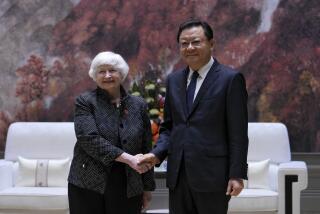Film official cautions against importing Hollywood values into China
It’s now the world’s biggest film market outside the U.S. But how do Hollywood filmmakers successfully penetrate the Great Wall of China?
Find reliable partners, hire screenwriters who’ve actually visited the country and avoid grafting “Hollywood values” onto the country.
“When you choose your subject matter you have to work hard, you have to think deep,” said Zhang Xun, former general manager of China Film Co-Production Corporation at a conference in Los Angeles on Monday. “Do not force Hollywood-style values onto China.”
Those were among the nuggets of advice offered by Xun and her colleagues at the inaugural U.S. China Film & Television Industry Expo at the L.A. Convention Center.
The event, which runs through Tuesday, is aimed at broadening business relationships between film and TV producers in the U.S. and China. Topics included navigating China’s censors and forming co-production deals, which allow producers to bypass China’s strict quotas that limit how much revenue foreign companies can collect.
The conference drew more than 400 American and Chinese film industry representatives, including representatives from the Shanghai Municipal Administration of Culture, Radio, Film & TV; the Beijing Municipal Bureau of Radio and Television; the Beijing International Film Festival; and Wuxi Studio, which operates a sprawling film production facility outside Shanghai. Co-productions must have some connection to China and one-third of the actors must be from the country.
The gathering comes at a time of growing partnerships between companies in Hollywood and China. Studios such as Disney, 20th Century Fox and DreamWorks Animation have been forming partnerships with Chinese companies to expand their business in the world’s most populous country, which generated $3.6 billion in box-office revenue last year, making it the largest international market for Hollywood movies.
During a panel on co-productions, Xun stressed the importance of cultural understanding between the countries. “U.S. screenwriters often haven’t even visited China,” she said.
Co-productions that are love stories, family dramas and animated movies do especially well in the Chinese market. Political dramas, not so much. “Talking about the Chinese leadership I suggest is not appropriate,” Xun added.
That said, Nansun Shi, a veteran Chinese filmmaker and distributor, stressed that a new generation of young filmmakers behind such films as “Lost in Thailand” and “Finding Mr. Right” are changing the types of movies released in her country.
“This is China now,” she said. “Be respectful of the sensitivities, then you can do anything you want.”
Ryan Kavanaugh, chief executive of Relativity Media, which was a producer on “The Forbidden Kingdom,” the 2008 co-production with Jackie Chan and Jet Li, said the film’s success was helped by the fact that it was based on a popular story, the legend of the Monkey King.
“In the U.S., you make a movie, you put it out and people buy it or they don’t,” Kavanaugh said. “In China it has to be ... not just relevant, but something that is meaningful both to the government and the Chinese people.”
Twitter: @rverrier
More to Read
From the Oscars to the Emmys.
Get the Envelope newsletter for exclusive awards season coverage, behind-the-scenes stories from the Envelope podcast and columnist Glenn Whipp’s must-read analysis.
You may occasionally receive promotional content from the Los Angeles Times.







